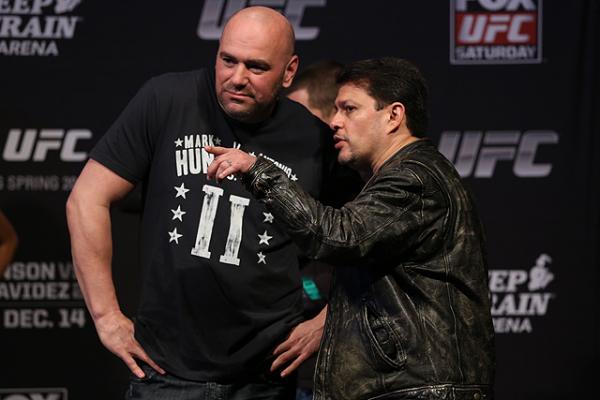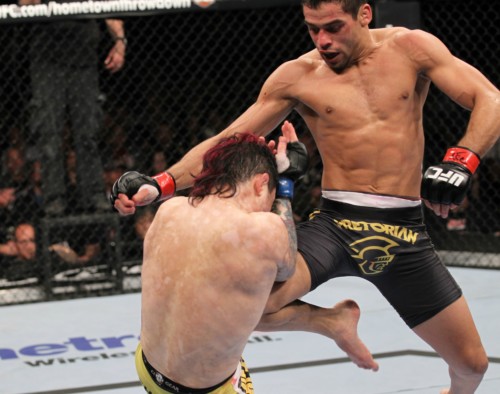Over the weekend, six UFC fighters received phone calls from Joe Silva informing them they were no longer a part of the UFC roster. The fighters who were cut were TUF 19 middleweight winner Eddie Gordon, TUF 19 light heavyweight runner-up Matt Van Buren, fan favorite Marcus Brimage, Canadian welterweight Chris Clements, Greek-American lightweight prospect Christos Giagos, and Texan Roger Narvaez. Including the six fighters just mentioned, up to 50 fighters are expected to be cut from the UFC roster in the coming weeks, and on Monday night a number of other fighters were expected to be let go, including TJ Waldburger, David Michaud and Soa Palelei, who retired.
There are several ways to look at the news.
Roster cuts are part of the sport, and the fighters know this – no fighter should ever expect job security in a sport like mixed martial arts. There are only so many spots on the roster and so many cards to book fighters on, so cuts are going to happen. The fighters know this when they sign up, or at least they should. From the UFC’s point of view, unless you are a megastar draw like Ronda Rousey or Conor McGregor, if you aren’t winning fights you are expendable. It’s simply the reality of the sport. All of the fighters who were cut this past week were coming off of losses, and none of them were draws, so even though most of them are exciting fighters, with the UFC needing more roster room, these fighters were the first to go, and many more are likely to follow.
At the same time, though, no one wants to lose a job, especially when you are a fighter at the bottom of the roster like these fighters were. Most of them were at the bottom end of the UFC’s pay scale, so even though many of them were only making $10,000 to show/$10,000 to win per fight, for fighters at the bottom of the totem pole that’s a lot of money. So to lose their jobs, it’s obviously not a good thing.

Playing devil’s advocate, though, remember that almost all of these fighters were in the lowest bracket of the Reebok sponsorship deal, so these fighters were only making an extra $2,500 in sponsorship money. That’s not much, and we’ve seen fighters like Josh Thomson, who was released by the UFC, say that signing with Bellator – even though his show and win money are way down – actually made them more total money because they got more money from sponsors.
So in a way, it could actually be beneficial for these fighters to be cut by the UFC, because it opens the door to sign with organizations like Bellator and World Series of Fighting where the shark tank isn’t as feisty and where sponsor money is better (although still not great, but that’s a product of MMA being a niche sport).
That’s what makes it a double-edged sword. For most fighters making their way through the ranks, the goal is to get to the UFC. It’s the dream of 99 percent of fighters to make it to the big show. But the reality is, being a mixed martial artist is a job, and you have to go where you can make the best living. For most, that’s still in the UFC, but not for all, so when the UFC deems you expendable, like it did with these fighters, it’s time to move on to Plan B. And for most, that will be Bellator and WSOF, where at least they can at least have sponsors and fight banners, and where they are more likely to make it to the top of their respective divisions.

Still, losing your job is never good, so it’s doubtful these fighters were happy about receiving their pink slips. Some, like the 25-year-old Giagos, are likely to use it as motivation to improve and get back to the show, but for a 39-year old like Clements, it could make the end of his or her career. But it does give them chances for new beginnings in new organizations, and it’s possible they could end up making more money, although that’s not a guarantee.
Cuts are a double-edged sword. The UFC could very well make a mistake and lose future contenders – it’s happened before – by cutting them so soon, but it’s part of the sport. And for these fighters, as a fan you can only hope they can make the most of it and better themselves, and not fall into a pit of depression and quit the sport, which has happened to others in the past. Because even if the UFC doesn’t want you, there are other organizations that might – just hope they want to pay you a decent wage, too.




